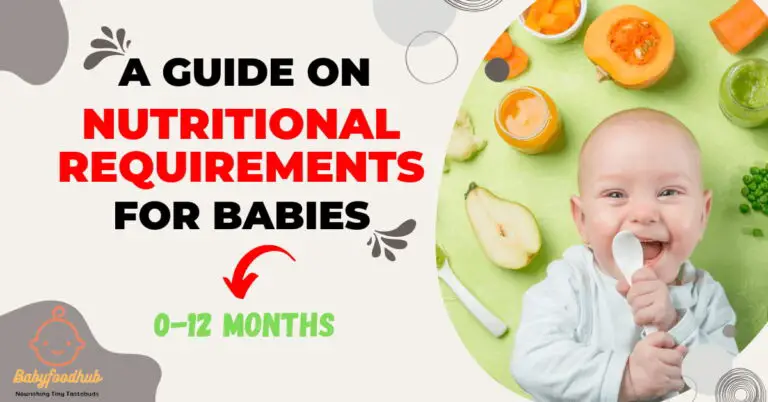Can I let my baby taste food at 3 months?

No, it is not recommended to let your baby taste food at 3 months. Introducing solid foods too early can potentially harm their developing digestive system and increase the risk of allergies.
Introducing solid foods to your baby is an important milestone, but it should be done at the right time. The American Academy of Pediatrics (AAP) recommends starting solid foods around 6 months, when your baby can sit up with support and shows signs of readiness, such as being able to hold their head up and showing interest in food.
At 3 months, your baby’s digestive system is still developing and their primary source of nutrition should be breast milk or formula. Introducing solid foods too early can lead to digestive issues, allergies, and even obesity later in life. It is important to consult with your pediatrician before introducing any solid foods to your baby.
Developing Digestive System At 3 Months

At 3 months, your baby’s digestive system is still developing, and introducing solid foods should be approached with caution. It’s generally recommended to wait until around 6 months of age when their digestive system is more mature.
Immature Digestive System:
- At 3 months, your baby’s digestive system is still developing. It is not yet fully equipped to handle solid foods or even complex food textures.
- The digestive organs, such as the stomach and intestines, are not yet mature enough to efficiently break down and absorb nutrients from solid foods.
- The esophagus and sphincter muscles that help move food from the mouth to the stomach are still developing, making it harder for your baby to swallow and digest solid foods.
- The lack of digestive enzymes necessary for food digestion is another reason to wait before introducing solid foods to your baby’s diet.
Lack Of Enzymes For Food Digestion:
- Your baby’s digestive system lacks the necessary enzymes to break down complex carbohydrates, proteins, and fats found in solid foods.
- Enzymes such as amylase, lipase, and protease are responsible for the breakdown of carbohydrates, fats, and proteins, respectively.
- These enzymes are produced in small quantities by the pancreas and are not fully functional in a 3-month-old baby’s digestive system.
- Without sufficient enzyme production, your baby may struggle to digest solid foods properly, leading to discomfort, gas, and potential digestive issues.
It is important to understand that introducing solid foods too early can put a strain on your baby’s immature digestive system. By waiting until around 6 months, you allow your baby’s digestive system to develop further, ensuring a smoother transition to solid foods.
Remember to consult with your pediatrician before making any changes to your baby’s diet, and trust your baby’s readiness cues before introducing solid foods. Your baby’s health and well-being should always be the guiding factors when it comes to their nutrition.
Potential Risks Of Early Food Introduction

Introducing solid foods to your baby at 3 months may pose potential risks. Consult with a pediatrician before making any decisions regarding your baby’s food introduction.
Introducing solid foods too early can pose several potential risks for infants. It’s important to be aware of these risks before deciding when to introduce your baby to solid foods. Here are some of the potential risks associated with early food
Choking And Gagging Hazards:
- Babies have a natural instinct to push food out of their mouths for the first few months of their lives, which helps protect them from choking hazards.
- Offering solids before your baby is developmentally ready can increase the risk of choking and gagging.
- Babies may also have difficulty swallowing or managing thicker textures early on, making them more susceptible to choking.
Increased Risk Of Allergies And Food Sensitivities:
- Early introduction of certain foods, especially those commonly associated with allergies such as peanuts, tree nuts, eggs, and seafood, can increase the risk of developing food allergies and sensitivities.
- It is advisable to wait until around 6 months of age before introducing high-risk allergenic foods to your baby.
Disruption Of Breastfeeding Or Formula Feeding Routine:
- Introducing solid foods too early can interfere with a baby’s natural feeding routine, whether it is breastfeeding or formula feeding.
- Babies have specific nutritional needs during their first months of life, and breast milk or formula should be their primary source of nutrition during this time.
- Offering solid foods prematurely can reduce the amount of breast milk or formula consumed, which may lead to nutrient deficiencies.
Signs Of Readiness For Solid Foods

Babies are generally ready to try solid foods around 6 months old. Introducing food too early can increase the risk of allergies and digestive issues. It is important to watch for signs of readiness, such as sitting up unassisted and showing interest in food.
At around three months, many new parents wonder if it is time to introduce their baby to solid foods. While it can be an exciting milestone, it is important to look out for signs that indicate your little one is ready for this new adventure.
Here are the key factors to consider:
Age And Developmental Milestones
- Motor skills development: Your baby needs to have good head and neck control, as well as the ability to sit up with support. This indicates that they have the physical capability to handle solid foods.
- Tongue reflex: When babies are born, they have a natural reflex that causes them to push food out of their mouths with their tongues. By the time they are around three months old, this reflex typically starts to diminish, making it easier for them to manage food.
- Curiosity about food: If your baby shows interest in what you are eating, tries to grab your food, or watches you intently, it could be a sign that they are ready to explore the world of solid foods.
- Good weight gain: Adequate growth and weight gain are crucial indicators of a baby’s readiness for solid foods. If your little one has been steadily gaining weight and is steadily above their birth weight, it suggests that their digestive system is maturing, making it more likely they are ready for solids.
- Increased appetite: If your baby seems unsatisfied after breastfeeding or bottle-feeding and is consistently hungry, it may be a sign that they are ready for supplemental solid foods.
As a loving parent, it’s crucial to pay attention to these signs to ensure a smooth transition to solid foods. Remember that every child has their own unique pace of development, so it is essential to consult with your pediatrician before making any significant changes to their diet.
Introducing Solid Foods At The Appropriate Time

Introducing solid foods to your baby at the appropriate time is crucial for their development. However, it is generally recommended to wait until around 6 months of age before introducing solids, as their digestive system is not yet ready at 3 months.
Recommended Age For Introducing Solids:
It is an exciting milestone when your baby is ready to start solid foods. However, it is important to introduce them at the appropriate time to ensure they are ready and able to handle the new textures and flavors. Here are the recommended ages for introducing solids:
- Around 6 months: This is the ideal age to begin introducing solids to your baby. At this stage, they will have better head and neck control, and their digestive system will be more developed to handle solid foods.
- Not before 4 months: It is generally advised not to start solids before 4 months. Before this age, their digestive system and immune system may not be fully ready, and introducing solids too early may increase the risk of allergies and other health issues.
- Every baby is different: Keep in mind that these age recommendations are general guidelines. Some babies may be ready a bit earlier or later, so it’s crucial to pay attention to your baby’s cues and consult with your pediatrician for personalized advice.
Gradual Introduction Of New Foods:
When introducing solid foods to your baby, it’s best to take a gradual approach. Here’s how you can do it:
- Start with single-ingredient purees: Begin by offering simple and mild flavors, like mashed bananas, sweet potatoes, carrot puree, or avocados. This allows your baby to get used to the taste and texture of solid foods.
- Introduce one new food at a time: Introduce new foods one at a time, with a few days in between each new introduction. This way, you can monitor your baby for any adverse reactions or allergies.
- Observe for signs of readiness: Look for signs that your baby is ready for the next stage of solid foods, such as sitting up with support, showing interest in food, and being able to move food from the front to the back of their mouth.
- Gradually increase variety and texture: As your baby grows older, you can gradually introduce a wider variety of fruits, vegetables, and other foods. You can also start offering mashed or pureed foods with a slightly thicker texture to encourage chewing and swallowing skills.
Remember, every baby develops at their own pace, so it’s important to be patient and responsive to your baby’s cues during the food introduction process. As always, consult with your pediatrician if you have any concerns or questions about introducing solids to your baby.
Consulting A Pediatrician
Consulting a pediatrician is crucial for new parents who are wondering if it is safe to let their baby taste food at 3 months. It’s important to seek professional advice to ensure your baby’s development and health are not compromised.
Seeking Professional Advice On Feeding Practices
It is essential to consult a pediatrician before introducing solid foods to your baby at three months. Here’s why:
- Expert guidance: Pediatricians specialize in the care of infants and can provide valuable insights into your baby’s unique needs.
- Age-appropriate recommendations: Your pediatrician can determine whether your baby is ready for solid foods based on their growth and development.
- Allergies and intolerances: An expert can discuss the potential risks and signs of food allergies or intolerances in babies.
- Balanced nutrition: A pediatrician can guide you on offering a variety of nutrients to support your baby’s growth and development.
- Feeding techniques: Your doctor can offer tips on introducing new foods, portion sizes, and methods to prevent choking hazards.
Remember, consulting a pediatrician ensures that you make informed decisions about your baby’s nutrition and overall well-being. Their expertise can help you navigate the exciting journey of introducing solid foods to your little one.
Frequently Asked Questions For Can I Let My Baby Taste Food At 3 Months
Is It Okay To Let My 3 Month-Old Taste Things?
Yes, it is safe to let your 3 month old taste things, but consult with your pediatrician to ensure suitability.
Can I Let My 3 Month Old Taste A Popsicle?
It is not recommended to let a 3-month-old taste a popsicle, as their digestive system is still developing.
Can I Give My 3 Month Old A Taste Of Banana?
Yes, you can give your 3-month-old a taste of banana.
What Foods Can A 3 Month Old Eat?
A 3-month-old can eat breast milk or formula exclusively. Solid foods should not be introduced yet.
Conclusion
Introducing solid foods to a baby at 3 months is not recommended by experts. While it may be tempting, it is important to follow the guidelines set by healthcare professionals. Starting solids too early can increase the risk of allergies, digestive issues, and even obesity.
Babies have specific developmental readiness cues, such as sitting up and showing interest in food, that are important indicators for starting solids. Relying solely on breast milk or formula provides all the necessary nutrients for a baby during their first few months of life.
It is crucial to prioritize a baby’s health and well-being over any societal pressures or advice from well-meaning friends or family members. Always consult with a pediatrician before making any decisions regarding a baby’s diet. Trusting in their expertise will ensure that the baby’s safety and nutrition needs are met.






